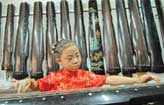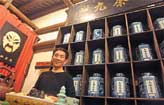China-US
Operation successful
Updated: 2011-07-29 12:04
(China Daily European Weekly)
|
 Domestic medical equipment suppliers are showing great growth potential thanks to the lower prices and improved quality of their products. Wu Dongjun / for China Daily |
Healthcare reform has given an injection to the medical devices and medical services industries
Zhao Ying, director of the Jiangsulu Community Health Center in Qingdao, never thought she could provide so many medical services at her office.
"Compared with general hospitals, community health centers were always simple and crude," says Zhao, who worked in a clinic at a municipal hospital before becoming the head of the local health center in Qingdao a decade ago.
"We didn't have enough medical devices in the past, and the little equipment we had was often second-hand from general hospitals, which were too old to offer a reliable health check," she says.
After the medical reform led by the Chinese government that started in 2006, the new 2,000-square-meter health center in East China's Shandong province is now able to provide more thorough screenings with its updated medical devices.
In 2009 the government passed a long-awaited medical reform plan that promised to spend 850 billion yuan (91 billion euros) by 2011 to provide universal medical services to the country's 1.3 billion people and upgrade services at basic medical institutions, thus creating a demand for new medical equipment.
On July 12 the central government allocated an additional 18.4 billion yuan to support the nation's medical reform. Of that, more than 4 billion yuan will be used to subsidize new medical equipment for traditional Chinese medicine hospitals at the county level.
Because of the continued push for better healthcare, China's medical device market is expected to double to $53.7 billion by 2015, according to Frost & Sullivan, a global growth consulting company.
The expansion of walk-in clinics, which provide basic medical services, has created opportunities for Chinese companies that typically produce products for clinics and county-level hospitals.
Currently, there are 1,708 State-run medical equipment companies, 4,875 foreign companies and 18,022 private enterprises in China, according to the Chamber of Commerce for Import & Export of Medicines & Health Products.
But international brands also have the potential to grow.
GE Healthcare China has dominated the high-end medical device market in China since 2003, typically accounting for 60 percent of the field. Almost all of its clients have been top hospitals in China, but its business strategy focuses on drawing in new business.
"GE will change our proportion from the high-end market versus the walk-in clinics market from 8:2 to 5:5 in no more than five years," says Duan Xiaoying, the president and CEO of GE in China.
And as it increases its financial interests in China, investing $2 billion last year, the US-based company is also increasing its presence. The Wall Street Journal reported last week it is in the process of moving its X-Ray business headquarters from Wisconsin to Beijing, the first of its businesses to be based in China.
In a recent interview with China Daily, Wu Wenhui, an official with the Munich engineering conglomerate Siemens Ltd's healthcare sector, discussed the company's plan to focus on the development of China's basic medical care.
|
 |
"During the next five years, Siemens' healthcare division will enter the medical care market in China's second- and third-tier cities and rural areas, in which our business growth will soon lift China to the division's second-largest market after the US," says Wu, president of North East Asia for the division.
China News has reported that more than 80 percent of the high-end medical device market in China is dominated by transnational companies; about 70 percent of medical appliances in the top-level Chinese hospitals are imported; and most imported medical devices are sold at three to five times of their local prices.
Qiu Guixing, a member of the Chinese Academy of Engineering and director of the orthopedics department at Peking Union Medical College Hospital in Beijing, says more than 20 million patients every year in China require operations.
Because of the limited supply of high-quality surgical instruments in China, many hospitals are forced to import them at very high prices, Qiu says. But the imported tools are not always the best solution because they were designed for the physique of Westerners and not Chinese people.
He expects many hospitals to turn to alternatives made by Chinese companies. Qiu also says the development of medical equipment by Chinese companies can reduce the cost of these devices. For this reason and with the government's support, domestic suppliers are expected to become major players in the medical market.
"The medical reform brings more opportunities for Chinese medical equipment companies, and the government will encourage medical institutions to purchase Chinese brands," Liu Diankui, deputy director-general of the department of planning and finance from the Ministry of Health, said at a recent forum.
According to Liu, when the government was considering which products and devices it approved of for hospitals to purchase, many domestic manufacturers were selected. And the purchasing budgets for smaller healthcare facilities are based on the price of Chinese medical devices, which also gives domestic companies a leg up.
In the new Jiangsulu Community Health Center, many of the new medical tools are Chinese brands.
Small pieces of equipment used to check blood pressure, eyes, and ears hang on the wall of a general practitioner's office. They are all from Yuyue Medical Equipment Inc, located in Danyang, Jiangsu province.
A multifunctional machine that checks body functions such as the liver sits in Zhao's office. Municipal hospitals used to be the only facilities able to afford the imported versions, which typically sell for more than 1 million yuan. The bill from a Chinese company: 350,000 yuan.
"All of the instructions are in Chinese and if the machine breaks down, engineers from the Chinese company can come to the rescue in a short period of time, unlike the imported machines that required a long waiting period for repairs," Zhao says. "It's convenient for our patients as well as for our medical personnel."
Facing strong international competitors, Chinese companies are still confident in their future.
"We offer lower prices, a better understanding of our clients and better customer service, an area where imported products cannot compete," says Xie Yufeng, vice-president of Beijing Wandong Medical Equipment Co Ltd.
Some of them are so confident they have their eye on the international market.
From 2006 to 2010, the imported medical device market doubled from 3.68 billion yuan to 7.96 billion yuan. The export market also increased, from 6.87 billion yuan to 14.7 billion yuan.
"Since the 2008 global financial crisis, many Western medical institutions had to reduce their budgets and are looking for lower priced products," says Cai Tianzhi, from the China Chamber of Commerce for Import & Export of Medicines & Health Products. "With the improvement of our R&D capacity and reasonable prices, Chinese medical devices will have a lot of potential in the international market."
Apart from the business aspect of the medical reform, the patients are the ones who are really benefiting from the medical reform.
Wang Lanxiang only needs 20 minutes in the Jiangsulu Community Health Center for a check-up now. And the medical service is free.
Before the new health center was rebuilt, this was impossible.
|
 An international medical equipment exhibition in Beijing attracted many suppliers. More than 80 percent of the high-end medical device market in China is dominated by transnational companies. Wu Changqing / for China Daily |
The 75-year-old woman used to travel 30 minutes to get to a municipal hospital at 7 am and wait all day for her 300-yuan medical examinations in Shinan district in Qingdao. She had a cardiac bypass surgery two years ago and needs frequent examinations to monitor her health.
"It saved our time, money and life."

Specials

Carrier set for maiden voyage
China is refitting an obsolete aircraft carrier bought from Ukraine for research and training purposes.
 Photo
Photo  Video
Video

Pulling heart strings
The 5,000-year-old guqin holds a special place for both european and Chinese music lovers

Fit to a tea
Sixth-generation member of tea family brews up new ideas to modernize a time-honored business